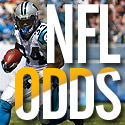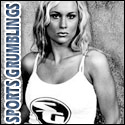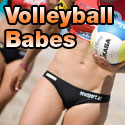No way, Jose
05/15/2002
Codding Home / Sports Channel / Bullz-Eye Home
I just don't get it. Honestly. I mean, I love stats as much as the next sports junkie, but haven't we figured out yet that numbers don't always tell the whole story?
Apparently not because, judging by some Internet polls I've seen the past few days, there are actually people who believe that the recently retired Jose Canseco is a Hall of Famer.
Like I said, I just don't get it.
About a year ago, when Canseco still stood 54 bombs shy of the celebrated 500-homer mark, I trashed his credentials. Perhaps all of you people who support his Hall worthiness didn't read that column. Now, 11 months and 16 taters later, I'm ready for a second round of bashing the former Bash Brother.
Please, this time pay attention. Take notes, if you like.
As I wrote in my earlier column, the Hall of Fame should be reserved for only the elite of the elite, not merely the elite of the good or even the elite of the very good. Canseco certainly fits into one of those three categories, but the question is which one?
His stats show that, from 1986 to 1991, Canseco was one of the most lethal offensive players in the game, hitting 204 homers and driving in 634 runs during that span. His 1986 Rookie of the Year award and 1988 MVP both further legitimize his six-year run of superiority, and there's no doubt that being baseball's first 40/40 man in 1988 helps his Cooperstown campaign.
Then, of course, Canseco is just the ninth player in baseball history with at least 400 homers and 200 steals on his stat sheet. Five of those nine players -- Hank Aaron, Willie Mays, Frank Robinson, Reggie Jackson and Dave Winfield -- are all Hall of Famers. Two more -- Barry Bonds and Sammy Sosa -- will one day join the others in Cooperstown.
So where does that leave Jose Canseco? In my mind, with the other 400/200 man, Andre Dawson -- on the outside looking in.
Canseco finished his career (assuming he is, in fact, done for good) with a .266 average, 1,877 hits and 1,942 strikeouts, a total good enough for second all-time. To my knowledge, the only player in the Hall with more strikeouts than hits (and, coincidentally, more strikeouts than Canseco) was Reggie Jackson, who notched 2,585 hits versus 2,597 whiffs. Of course, the fact that Reggie managed to collect more than 2,500 hits along with his 563 homers and a truckload of World Series rings places him miles ahead of Canseco, who failed to reach even the 2,000-hit plateau.
Wait, I've got more.
Yeah, Canseco smacked 462 homers, which is good for 23rd on the all-time list, but as I said earlier, 204 of those (44%) came in the six-year duration from 1986-1991, a healthy average of 34 a year. In his other 11 big league seasons, though, Jose hit just 258 homers, a rather mundane mark of just 23.5 per year. This trend also shows up in his RBI totals, driving in 634 runs from 1986-1991 (105.7/year) and just 773 in his remaining 11 seasons (70.3/year). In fact, after 1991 Canseco only tallied one 100-RBI season, in 1998 with Toronto when he hit .237 with 46 homers and 107 RBI.
Do you see what I'm getting at here?
Even if I cut the guy some slack by taking the numbers from his 96 at-bat 1985 campaign (five HR, 13 RBI) out of the equation, his off-year averages still sit at a paltry 25.5 homers and 76 RBI per season.
Not exactly inspiring stats, huh?
I know that you supporters out there always love to highlight Canseco's steals, claiming he was a "multi-dimensional" player. But again, the career numbers lie -- Canseco swiped 121 bases during his impressive six-year run, an average of 20.2 per season, but just 79 throughout the rest of his career. And while his success rate reached nearly 73% from 1986-1991, it dropped to just 65% during his final 10 years.
So let's line up all those season averages:
1986-91
.269, 34 homers, 105.7 RBI and 20.2 steals
1992-2001
.263, 25.5 homers, 76 RBI and 7.9 steals
While it's true that, throughout the early stages of his career, Canseco was a force at the plate and on the bases, his numbers dropped off dramatically after 1991. Sure, he put together a few good years in the mid-1990s (1994 with Texas, 1995 with Boston, 1998 with Toronto and 1999 with Tampa Bay), but he never again reached the heights he established earlier in his career, a disturbing stagnation when you consider the explosive jump in offensive numbers during the latter part of the decade.
I know, I know -- Canseco has two World Series rings to go along with his Jekyl and Hyde numbers. But while I obviously can't deny that he's been on two championship teams, I can -- with a healthy dose of confidence -- argue that he really only earned one of those, in 1989 with Oakland. He played 37 regular season games with the Yankees two years ago, struck out during his only postseason at-bat that October, then collected his jewelry a few months later.
Like I said, he may have two rings but he only earned one.
So in the end, this debate comes back to my initial interpretation of a Hall of Fame career: the elite of the elite, not merely the elite of the good. For six years, Jose Canseco represented the elite of the elite, hitting for power, driving in runs, stealing bases, winning an MVP and a World Series.
But throughout the final 10 years of his undoubtedly impressive career, Canseco was simply a good power hitter who couldn't stay healthy, and good ain't good enough for Cooperstown. Not in my book, anyway.
As is the case with Don Mattingly and Andre Dawson, Canseco's lack of sustained excellence should ultimately keep him out of the Hall of Fame. Six fantastic years can merit some postseason hardware and a handful of All Star appearances, but I can only hope it takes much more to earn baseball's ultimate honor.
Plus, the guy had a 27.00 career ERA, and that's gotta count against him.
In the Bullz-Eye
The Sacramento Kings. It's never easy to knock off the champs, but when you're
missing one of your key players, the challenge is even greater. The Kings
certainly have a chance to beat the L.A. Lakers in the Western Conference
Finals, but for at least the first two games of the series they'll be without
All-Star forward Peja Stojakovic, who is nursing a sprained right ankle. It
should be a great series, and if Sacramento can at least go 1-1 with the
explosive Stojakovic on the sidelines, the Lakers could be in trouble.






